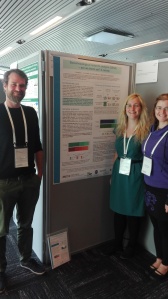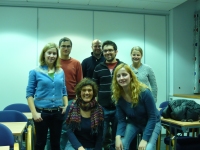Envision brings together a powerful group of UK researchers with 44 industry and NGO partners to provide a new generation of environmental scientists with the skills, knowledge and experience they need to take on the challenges of a changing world.
Funded by the Natural Environment Research Council (NERC), Lancaster University is leading the initiative which brings together the Universities of Nottingham and Bangor, the Centre for Ecology and Hydrology, the British Geological Survey and Rothamsted Research. The initiative also involves large multinationals, a large number of SMEs and international research centres.
Students will benefit from: broad research themes, access to leading world experts, close ties with business, relevant work experience and leadership training. Envision will recruit 12 PhD students per year for the next five years – starting from October 2014.
The project “Novel genetic tools for conservation and management of vulnerable manta ray” combines academic enquiry into evolutionary processes and the biology of a little-studied, charismatic endangered species – Manta Rays – with the development of resources and applied tools required for its sustainable exploitation, conservation and protection under international convention. The project offers a wealth of opportunities for the student to gain knowledge of, and experience in, genome-wide approaches to studies of evolutionary biology, population genetics and genetic marker development and their transfer to applied fisheries management and forensic genetics.
Training will be provided in: Genomics; Bioinformatics; Phylogenetic reconstruction; Population genetics; Diagnostic test development; Food supply chain authentication, DNA forensics and science communication. Training across such a comprehensive suite of skills and technologies directly address several identified UK Skill Gaps, including multi-disciplinarity, data management, translating research into practice, fieldwork, taxonomy and systematics, and sustainability science, planning and prioritization. The focus of translating conservation science into policy at both the institutional and popular levels will equip the student with experience in science communication across stakeholders and end-users. ENVISION, the NERC Doctoral Training Programme in which Bangor University is a partner, is committed to a high quality graduate training programme to ensure that the successful candidate has access to opportunities to develop their career skills and experience.
The studentship will be based within the Molecular Ecology and Fisheries Genetics Laboratory, a world leader in the analyses of molecular data from aquatic biota, situated in the Environment Centre Wales at Bangor University, UK. The MEFGL offers a dynamic and supportive training environment for young scientists, currently with 6 academic staff, 4 postdoctoral scientists and 8 PhD students. Essential skills are a minimum 2:1 BSc (or equivalent in Life Sciences), with good numerate skills and a strong enthusiasm for biodiversity science. Desirable skills are phylogenetic, population genetic, forensic or bioinformatics experience.
UK students will receive stipend and fees, EU students will receive fees only. International students are not eligible for this funding.
Application deadline: 16th February 2014
Please see also: http://www.envision-dtp.org/portal/projects/001985/novel-genetic-tools-for-conservation-and-management-of-vulnerable-manta-rays





